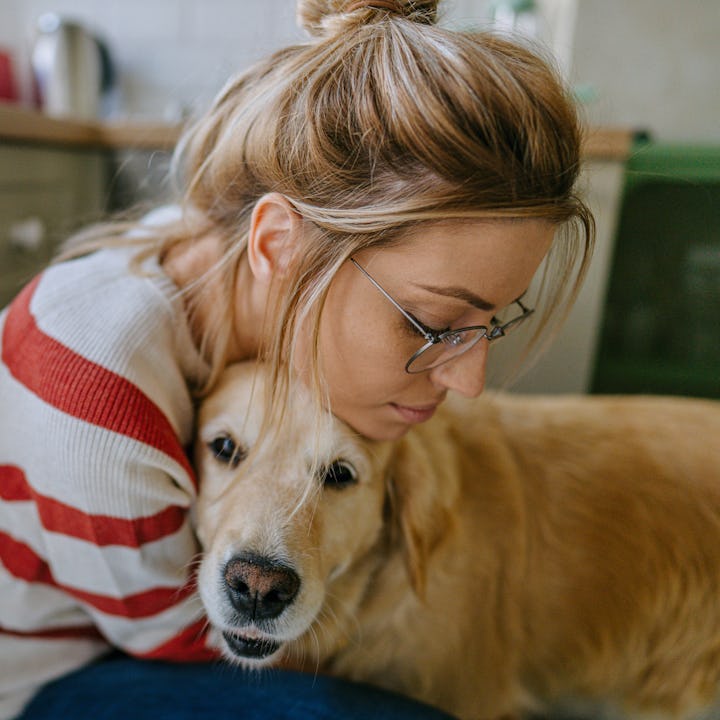Is Your Dog Ruining Your Social Life? You Aren’t Alone
I asked veterinarian Dr. Michael Thompson for advice, and he suggested these three tips.

About a year after my husband and I got married, we ended up leaving New York City and moving across the country to California. This meant saying goodbye to countless family members and close friends. It was a lot of change to deal with all at once, and I’d be lying if I said I didn’t second guess the decision on numerous occasions. Yet the one solace I took from this huge transition was the fact that, once we got settled, we were getting a dog.
I hadn’t had a dog since I was a kid and couldn’t wait to bring a fur baby into our family. Now, five years later, we have the most beautiful yellow lab you can imagine. She is sweet and adorable and the picture-perfect image of what you envision a yellow lab to be. And yet, despite how idyllic she appears to be on Instagram, the reality of the situation is that my dog is ruining my social life in a way I never expected.
Don’t get me wrong — I absolutely love my dog. She loves to snuggle and has such a funny personality and a genuinely charming nature. She loves people and other dogs… which is actually where the bulk of the problem lies. She loves everyone a little too much.
Even at the age of five years old, my dog continues to exhibit the classic lab behavior of “puppy energy.” But unlike when she was a little pup, she’s now a full-grown dog, which makes that energy a lot more difficult to control, specifically when we go out on walks.
When we first got her, I figured this would be a great way to potentially meet new people. We had just moved to a new state and didn't know anyone, which meant starting from scratch in the friends department. I thought having a dog would make us more approachable around the neighborhood, with her serving as a cute, pet-able buffer.
However, even after puppy training classes and various sessions with trainers, our dog continues to exude over-the-top enthusiasm when we encounter other humans or dogs out on walks. It's gotten to the point where I actively try to avoid walking by other people just so she doesn't try to pull my arm out of its socket when trying to greet them (and by greet them, I mean jump all over them when they try to pet her).
Obviously, this has thrown a huge wrench in the whole make-friends-while-walking-your-dog plan. But that doesn't have to be the end of this story. Thankfully, there are a few cost-effective solutions out there that could help make these daily outings a little less ruff (sorry, not sorry) for me and anyone else out there whose pup is a little too over-excitable for their liking.
Focus, Focus, Focus
According to Dr. Michael Thompson, veterinarian and founder of Pets Food Safety, who spoke with Scary Mommy on the subject, one helpful strategy involves implementing a focus command to your dog while on walks. "Teach your dog to focus on you with a simple command such as 'look' or 'focus,' rewarding them with treats for compliance," Thompson explains. "This can help redirect their attention away from distractions, including approaching people."
The idea is that learning to focus on you will help keep their behavior more grounded and make them less overly excited about their surroundings. "Gradual exposure to the stimulus that excites them, coupled with positive reinforcement, can desensitize and reduce their over-the-top greetings," Thompson adds. The key here, though, is to be consistent and incorporate the training into part of your daily routine. "Short, daily training sessions are more effective than occasional, longer ones," he advises.
A Change in Harness
For some, you may even notice a massive difference in your dog's behavior by switching the type of harness or collar you use. Thompson believes the best option is "a no-pull harness which provides better control during walks without discomfort for your dog." But just like with any harness, check your dog's measurements before purchasing anything to make sure you get the correct size that fits them best.
The Key: Mental and Physical Exercise
Most importantly, dogs need a proper outlet for their energy, and more often than not, exercise for both the mind and body can go a long way in helping to curb your pup's behavior. "Don't overlook the power of exercise," warns Thompson. "Adequate physical and mental stimulation can significantly reduce excess energy, making your dog calmer and more manageable during encounters with people. Interactive toys and puzzles, along with regular, vigorous exercise sessions, can make a noticeable difference."
I care for my dog like she's my own child, but while I'm sure she likes to think she's the center and sole provider of my social circle, I'm hoping these tips will help make both of us more approachable in the future — and maybe save my arm from some serious tugging in the process.